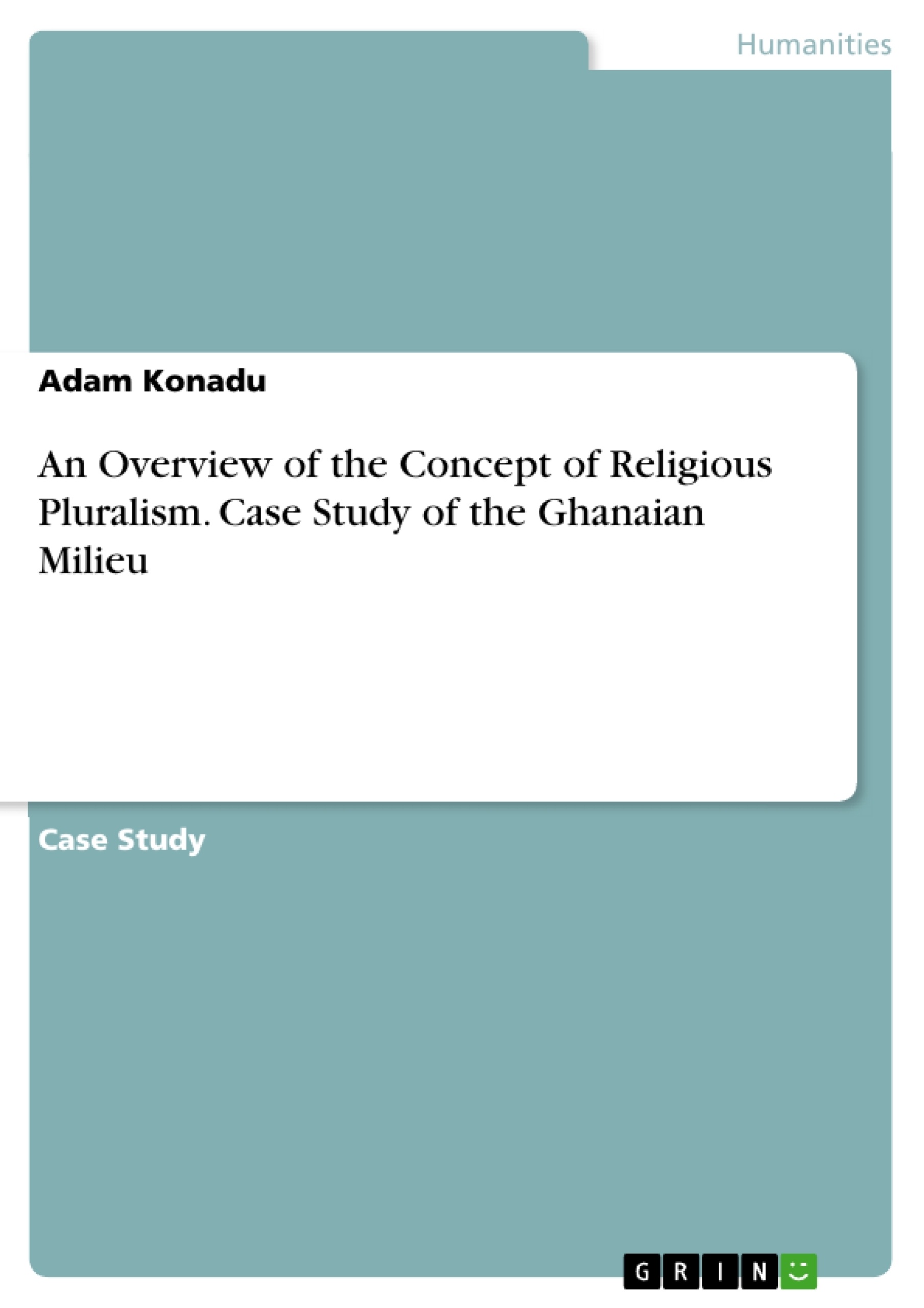This paper provides an overview of the concept of Religious Pluralism. By so doing, it attempts to present the definition of the concept religious pluralism, its basis, characteristics, causes, ways of ensuring it, effects, challenges and the future of religious pluralism in Ghana.
Inhaltsverzeichnis (Table of Contents)
- INTRODUCTION
- DEFINITION OF RELIGIOUS PLURALISM
- CHARACTERISTICS OF RELIGIOUS PLURALISM
- Religious inclusivism:
- Religious tolerance...
- Religious freedom ........
- Religious diversity.
- Interfaith dialogue..
- World community
- Dialogue of life...
- WAYS OF ENSURING AND PROMOTING RELIGIOUS PLURALISM
- Tolerance.........
- Dialogue
- Education...
- Interreligious conferences and seminars
- Interreligious and national festivals
- Avoidance of unnecessary blackmailing......
- Mutual support and impartiality..........\n
- Interreligious bodies.
- Entertainment ..
- IMPORTANCE OF RELIGIOUS PLURALISM
- Religious pluralism enhances religiosity.
- Religious pluralism promotes tolerance and friendliness
- Religious pluralism fosters a sense of belongingness and mutual co-existence ........
- It ensures and promotes peace in the society.
- It promotes unity and mutual respect..
- It brings about development.......
- DEMERITS OF RELIGIOUS PLURALISM
- CHALLENGES / HINDRANCES TO RELIGIOUS PLURALISM
- Particularistic theology
- Dogmaticism
- Syncreticism.
- Proselytism ..
- Secularism.
- Malignity
- Ignorance....
- Violence
- Proselytisation
- Religious freedom.
- THE FUTURE OF RELIGIOUS PLURALISM
Zielsetzung und Themenschwerpunkte (Objectives and Key Themes)
This paper provides an overview of the concept of religious pluralism in the Ghanaian context. It explores the definition, characteristics, causes, ways of ensuring it, effects, challenges, and the future of religious pluralism in Ghana.
- The definition and characteristics of religious pluralism
- Ways to ensure and promote religious pluralism
- The importance and demerits of religious pluralism
- Challenges and hindrances to religious pluralism
- The future of religious pluralism in Ghana
Zusammenfassung der Kapitel (Chapter Summaries)
The introduction defines religious pluralism and introduces the case study of Ghana. Chapter 2 explores the concept of religious pluralism, outlining its definition and its presence in Ghanaian society. Chapter 3 delves into the characteristics of religious pluralism, highlighting elements such as religious inclusivism, tolerance, freedom, and diversity.
Chapter 4 focuses on ways to ensure and promote religious pluralism in Ghana, including tolerance, dialogue, education, interreligious conferences and seminars, interreligious and national festivals, and avoidance of unnecessary blackmailing. Chapter 5 highlights the importance of religious pluralism, discussing its positive effects on religiosity, tolerance, belonging, peace, unity, and development.
Chapter 6 briefly addresses the potential demerits of religious pluralism. Chapter 7 outlines challenges and hindrances to religious pluralism in Ghana, including particularistic theology, dogmaticism, syncretism, proselytism, secularism, malignancy, ignorance, violence, and religious freedom.
Schlüsselwörter (Keywords)
The main keywords of this text include religious pluralism, Ghana, inclusivism, tolerance, freedom, diversity, interfaith dialogue, challenges, and the future of religious pluralism.
Frequently Asked Questions
What is the definition of religious pluralism in the Ghanaian context?
It refers to the peaceful co-existence and mutual respect between different religious groups (Christianity, Islam, Traditional religions) within Ghana.
What are the characteristics of religious pluralism?
Key characteristics include religious tolerance, freedom, diversity, interfaith dialogue, and inclusivism.
How can religious pluralism be promoted in Ghana?
Through education, interreligious conferences, national festivals, mutual support between religious bodies, and avoiding "blackmailing" of other faiths.
What are the main challenges to religious pluralism?
Challenges include dogmatism, proselytism (forced conversion), ignorance, particularistic theology, and religious violence.
What is the future of religious pluralism in Ghana?
The paper explores how the ongoing dialogue of life and institutional cooperation can ensure long-term peace and development in the country.
- Quote paper
- Adam Konadu (Author), 2014, An Overview of the Concept of Religious Pluralism. Case Study of the Ghanaian Milieu, Munich, GRIN Verlag, https://www.grin.com/document/387410



